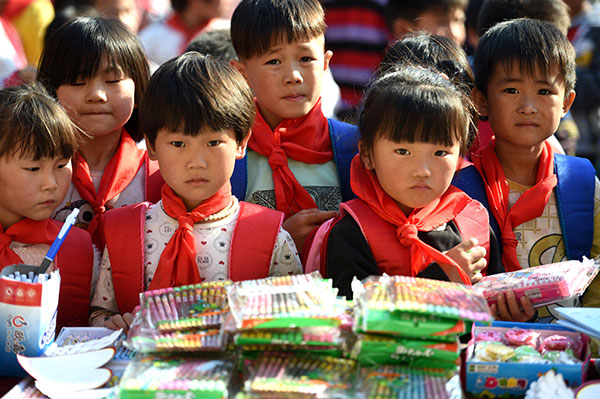Ending poverty needs sustainable planning
(China Daily) Updated: 2015-10-14 07:31
 |
|
Children from poor families in Bozhou, Anhui province, receive stationery donated by volunteers. China will work hard to lift about 70 million people in rural areas out of poverty by the end of 2020. LIU QINLI/CHINA DAILY |
For China to realize its goal of building a better-off society by 2020, lifting the country's 70 million poor residents out of abject poverty is a target that must be met. Officials from the office in charge of the work, which is under the State Council, the country's Cabinet, expressed their optimism on Monday the task will be fulfilled on time.
It is good to have a target, which entails necessary plans and detailed measures for it to be realized. But the planners should not take it for granted that dragging that many residents out of destitution in six years will mean the problem of poverty is addressed once and for all.
Even if the input of money and manpower by the government indeed gives the necessary helping hand to the last batch of poverty-stricken residents, it is still just a stage in the battle to eliminate poverty for good.
Over the last three decades or so, it has not been rare for some who have been pulled out of extreme poverty to fall back into it again for one reason or another. It is therefore possible that some of these 70 million people, who live below China's official poverty line of nearly one US dollar a day, will once again experience problems making ends meet in the future. In addition, China is yet to align with the World Bank's poverty line of $1.25 a day, not to mention that relative poverty always calls for open-ended alleviation efforts by any government.
When it comes to the designing of poverty alleviation strategies, sustainable long-term plans are needed not just quick-fix measures aimed at meeting the target. These should be designed so that the residents lifted out of poverty do not constantly rely on aid from the government and instead are able to make a living through their own efforts.
Furthermore, a long-term and efficient social security net needs to be established to serve as a safeguard against any contingencies, for example, serious diseases, which can pull even better-off families into poverty.
To maximize the benefits of the input of money and manpower, all related factors should converge in programs that help people to help themselves. Thus the efficiency of anti-poverty efforts will be a test of not just our wisdom but also of our management capability and integrity.











